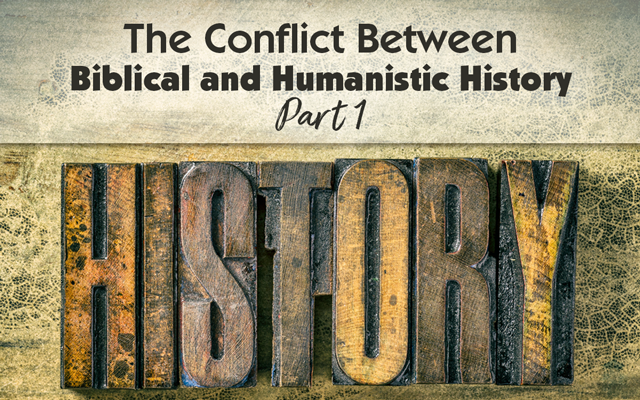The Conflict Between Biblical and Humanistic History – Part 1


Ten years later, my naivety makes me smile. As a young student of history, I confidently thought history was one subject I could read without being tainted by author bias. How can you skew, misinterpret or worse, intentionally lie about events sealed in the past? Sadly, it didn’t take long for me to lose my academic innocence; like science or philosophy, history is filtered through personal worldview. Yet a common belief is that humanistic historians somehow remain neutral regarding their work.
To clarify terms, by humanistic history, we mean history that is told without a biblical worldview. Even events, persons and places not recorded in Scripture can still be seen through biblical lenses. Yet, some still argue that secular history has teaching privileges alongside the Bible in the Christian home. Let the Bible speak to the spiritual things, they say, and let the historians speak to history. Before continuing our series on teaching history like Scripture does, let’s unpack the question: Does humanistic history contradict the Bible?
Who is God?
As discussed before, the Bible’s historical accounts rest on three pillars:
1. Biblical history has God as the principal or central character.
2. Biblical history tells the end from the beginning.
3. Biblical history is told through men and women in their relationship to God.
God wastes no time in introducing Himself to us. In the first three verses of Genesis 1, He introduces Himself as a triune Godhead Who exists before time, space, matter and the earth. At the very beginning, God is revealing Who He is, His nature and His intention for us to know Him.
“For the invisible things of him from the creation of the world are clearly seen, being understood by the things that are made, even his eternal power and Godhead; so that they are without excuse” (Romans 1:20).
Likewise, Scripture enlightens us in that the knowledge of the holy leads to understanding – including a proper understanding of history.
“The fear of the Lord is the beginning of wisdom: and the knowledge of the holy is understanding” (Proverbs 9:10).
On the contrary, humanistic history denies a creator. Due to generations of historians being taught that time, the universe and life originated from natural causes (i.e. evolution), they start with no knowledge of the holy. Without this knowledge, how can they possibly understand the scope and purpose of history? If time is an accident, if the universe is an accident and mankind is himself the product of natural accidents, then history is nothing more than random events without rhyme or reason. There is no point, no purpose, no promises to be gleaned from its pages.
History, like every subject must begin with the knowledge of our Creator. If children are to know and love history, they must know and love its Author and central character.
Kenzi Knapp is a follower of Christ, homeschool graduate and student of history. A fourth generation Missourian she enjoys writing about daily life enrolled in Gods great course of faith and His story throughout the ages at her blog, Honey Rock Hills.









































